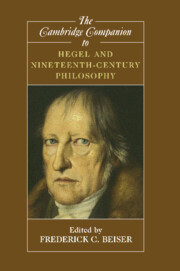Book contents
- Frontmatter
- Introduction: The Puzzling Hegel Renaissance
- 1 Hegel: A Life
- 2 Ancient Skepticism, Modern Naturalism, and Nihilism in Hegel’s Early Jena Writings
- 3 Hegel’s Phenomenology as a Systematic Fragment
- 4 The Independence and Dependence of Self-Consciousness: The Dialectic of Lord and Bondsman in Hegel's Phenomenology of Spirit
- 5 Hegel’s Logic
- 6 Hegel’s Idealism
- 7 Hegel and Hermeneutics
- 8 Hegel’s Social Philosophy
- 9 Hegel’s Philosophy of Religion
- 10 Hegel and Mysticism
- 11 Philosophizing about Nature: Hegel’s Philosophical Project
- 12 Hegel’s Criticism of Newton
- 13 The Logic of Life: Hegel’s Philosophical Defense of Teleological Explanation of Living Beings
- 14 Hegel and Aesthetics: The Practice and “Pastness” of Art
- 15 The Absence of Aesthetics in Hegel’s Aesthetics
- Bibliography
- Index
9 - Hegel’s Philosophy of Religion
Published online by Cambridge University Press: 28 July 2009
- Frontmatter
- Introduction: The Puzzling Hegel Renaissance
- 1 Hegel: A Life
- 2 Ancient Skepticism, Modern Naturalism, and Nihilism in Hegel’s Early Jena Writings
- 3 Hegel’s Phenomenology as a Systematic Fragment
- 4 The Independence and Dependence of Self-Consciousness: The Dialectic of Lord and Bondsman in Hegel's Phenomenology of Spirit
- 5 Hegel’s Logic
- 6 Hegel’s Idealism
- 7 Hegel and Hermeneutics
- 8 Hegel’s Social Philosophy
- 9 Hegel’s Philosophy of Religion
- 10 Hegel and Mysticism
- 11 Philosophizing about Nature: Hegel’s Philosophical Project
- 12 Hegel’s Criticism of Newton
- 13 The Logic of Life: Hegel’s Philosophical Defense of Teleological Explanation of Living Beings
- 14 Hegel and Aesthetics: The Practice and “Pastness” of Art
- 15 The Absence of Aesthetics in Hegel’s Aesthetics
- Bibliography
- Index
Summary
HEGEL’S LECTURES ON THE PHILOSOPHY OF RELIGION
Hegel lectured on the philosophy of religion for the first time in the summer semester of 1821 at the University of Berlin, lectures that he was to repeat on three occasions, in 1824, 1827, and 1831. His delay in addressing the topic of religion was not a sign of lack of interest. On the contrary, there was no topic in which he had a deeper and more abiding concern, as evidenced from his days as a theological student in Tübingen through the years in Frankfurt, Jena, and Nuremberg. Upon his departure from Jena, he wrote to a friend: “I was eager to lecture on theology at a university and might well have done so after some years of continuing to lecture on philosophy.” However, the opportunity to do so did not present itself until after his arrival in Berlin. He was stimulated to offer his own views by the impending publication of Friedrich Schleiermacher's Glaubenslehre, a work with which Hegel had reason to believe he would find sharp disagreements. As a philosopher, he did not lecture on theology per se but on philosophy of religion, a discipline that he took to be engaged not simply with the phenomenon of religion but with the nature and reality of the object of religion, namely, God. Since this transcendent referent had been rendered problematic by Enlightenment philosophy, history, and science, Hegel set out to develop a new philosophical theology that would reestablish the conceptual foundations of religion by offering a postmetaphysical and postcritical way of thinking about God.
- Type
- Chapter
- Information
- Publisher: Cambridge University PressPrint publication year: 2008
- 2
- Cited by

